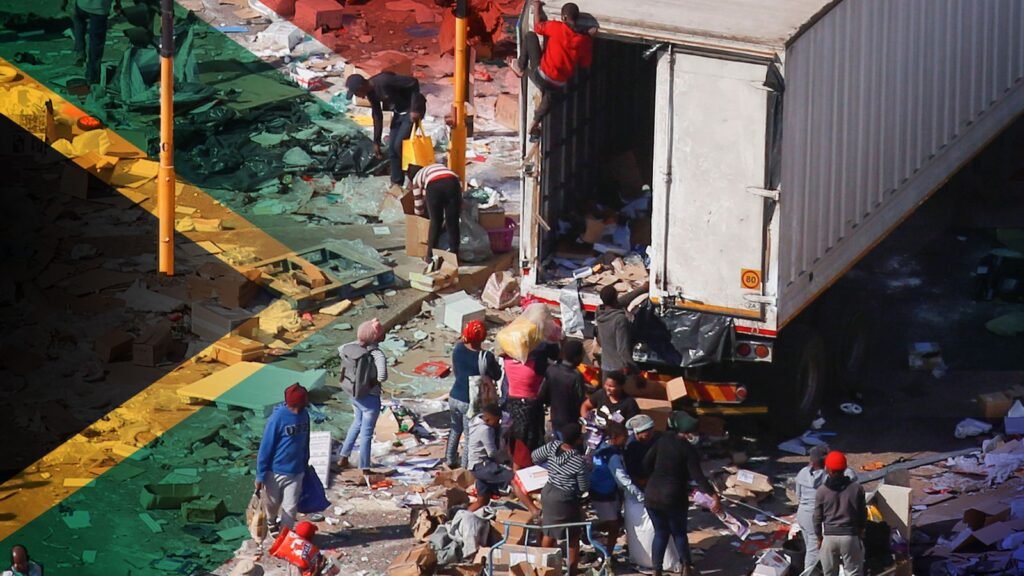|
Listen to article
Getting your Trinity Audio player ready...
|

The terrifying riots in South Africa have died down a bit, but not before causing significant damage. Not only the deaths, but the damage to the economy and to investor confidence must be substantial. A major oil refinery was shut down, highways were blocked, telecom towers and warehouses were torched. Thousands of small businesses as well as malls were looted, and in many cases, burnt to the ground.
From an Indian point of view, the plight of Indian-origin businesses, as well as of people of Indian origin, is of great concern. There is the naive belief in some circles that because of the Gandhi legacy (after all, he lived in that country for years) and the respect Nelson Mandela had for him, there must be some goodwill among South Africans for Indians.
That is far from the case, as a rule. It is just as risible as believing American blacks have some fellow-feeling for Indians just because Martin Luther King spoke glowingly of Gandhi. On the contrary, the average American black views all Asians as competing for the crumbs that non-whites get.
I realized this long ago about South Africa while reading apartheid-era novels, wherein the Indian-origin people are members of the African National Congress, but they are distinctly second-class. Quite rightly, black South Africans dominate: it is their country, after all. A few whites, propelled by what we now call ‘social justice’ are also part of the inner circles. But the Indians are outsiders, tolerated at best, excluded at worst.
We have seen this in many countries: Tamils in Sri Lanka, Chettiars in Burma, Gujaratis in Uganda and much of East Africa, and Tamil plantation workers in Malaysia. The list goes on. It mirrors the Jewish experience in much of Europe, and the Chinese experience in Southeast Asia: unloved immigrants who nevertheless are important for the economy.
Apartheid-era South Africa, if I am not mistaken, had clear divisions: whites, coloreds (mixed-race people), blacks and Indians. There was little mixing across the groups. I knew a white American in Boston who had worked in South Africa. He had interacted with hardly any Indians, and thought they were under the ‘colored’ rubric. In a Laurens van der Post novel, there’s a character named Miss Naidoo, an ANC member, and a cripple. I think the metaphor was not accidental.
Indians have a history of being outsiders in the societies they immigrate to; and often the butt of both envy and disdain, as they are non-violent, and often affluent, and thus perfect victims. It is also known that the Indian government does very little even for its expatriate citizens, not to mention long-ago migrants. This could well be the reason that many Indian businesses were attacked. Durban, KwaZulu Natal, is where most Indians live.
The prevailing wisdom from the Western media is that the riots were political, instigated, and pre-planned. It is said that the goal was regime change, as the current president, Cyril Ramaphosa, is unwinding widespread corruption by the previous president, Jacob Zuma, whose arrest was the proximate cause for the troubles. Zuma’s children and foundation, as well as his ethnic group, the dominant Zulus, are accused of malfeasance.
We in India should note those words: regime-change, instigated, pre-planned riots, ethnic-group, corruption. This is precisely what is going on here too: the ancien regime, corrupt to the core, manufactures reasons for riots, with the help of malign outsiders, and its vote-banks can create disturbances at the drop of a hat. The intent is a ‘color revolution’, a violent overthrow of the current regime. It is an exact match with what apparently went down in South Africa.
But there are dissenting voices. A friend who’s a professor at the University of Cape Town (he could well be a Zulu himself; I didn’t ask), said, and I quote his message verbatim, in its entirety:
Looting and many forms of violent public protests are very common in South Africa. The current one has been very massive. To a large extent, this has been a result of the covid-19 pandemic. Due to the lock down restrictions, unemployment has risen so much, people are struggling. Initially the government was providing a sort of social grant to cushion the effects, but that was stopped months ago. So, any trigger would get people into the streets.
The professor is painting a different picture. South Africa has long been infamous for violence, including against foreigners; car-jackings; murders; and general mayhem. Coincidentally, I was watching a film named ‘Chappie’ about robot cops set in Johannesburg: the crime is getting to be too much for human police to handle.
So, which is it? A pure political spectacle as we see in India, or is it the aakrosham of a people who were restive anyway, but have been devastated by the pandemic? It is important for us to know. South Africa is a beautiful country; it is the locomotive economy for the entire continent; and if it collapses into a failed state, it puts a big crimp into India’s own Indian-Ocean-Rim based economic prospects for the future.






Add comment